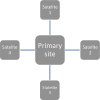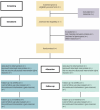Behavioural activation for people in custody with depression: A protocol for a feasibility randomised controlled study
- PMID: 38870235
- PMCID: PMC11175500
- DOI: 10.1371/journal.pone.0304767
Behavioural activation for people in custody with depression: A protocol for a feasibility randomised controlled study
Abstract
People in custody are at high risk of developing depression. Accessing psychological treatments in a prison setting is a particular challenge, in part, due to difficulties accessing specialist mental health workers. Behavioural Activation (BA) may be helpful in improving health outcomes for people in custody experiencing depressive symptoms. The aim of this study is to establish the feasibility and acceptability of custodial health nurses delivering BA to improve depressive symptoms of people in custody. We will conduct a pilot randomised controlled trial with process observation examining the feasibility and acceptability of BA in treating people in custody with depressive symptoms. 60 people in custody presenting with depressive symptoms will be randomised to receive BA plus treatment as usual (TAU) or TAU provided by custodial health nurses. Eight custodial health nurses will be recruited, trained, and deliver BA. BA will be delivered twice a week for six weeks, with sessions lasting up to 30 minutes. Changes in depression and quality of life (QoL) will be assessed at baseline, 6 weeks, and 3 months post-intervention. Participants will be interviewed to understand feasibility and acceptability of BA in prison settings. The findings will inform the design of a randomised controlled trial to test the efficacy of BA for people in custody with depression. Findings will help determine whether BA for depression is suited to prison health care system and services. Improving depressive symptoms in people in custody has benefits beyond prison settings. The Central Adelaide Local Health Network Human Research Ethics Committee and University of South Australia Human Research Ethics Committee have approved the study. The trial results will be disseminated through peer-reviewed journals and scientific conferences and reported to local stakeholders and policy makers. If feasibility and acceptability is demonstrated, we will seek to progress to an effectiveness study. A potential strength of the trial model proposed, is in its scalability, with potential to increase the trial sites and locations. This trial has been prospectively registered with the Australian New Zealand Clinical Trials Registry (reference number: ACTRN12623000346673p). Trial registration ACTRN12623000346673p.
Copyright: © 2024 Walsh et al. This is an open access article distributed under the terms of the Creative Commons Attribution License, which permits unrestricted use, distribution, and reproduction in any medium, provided the original author and source are credited.
Conflict of interest statement
I have read the journal’s policy and the authors of this manuscript have the following competing interests: MJ, SD, RG, and SW collaborated on the development and delivery of the online training in BA. The academic and research team members did not receive any extra payment for this work apart from their normal salary. This does not alter our adherence to PLOS ONE policies on sharing data and materials.
Figures
References
-
- World Health Organization. Depressive disorder (depression) Geneva: World Health Organization; 2023 [updated 2023. Available from: https://www.who.int/news-room/fact-sheets/detail/depression.
Publication types
MeSH terms
LinkOut - more resources
Full Text Sources
Medical



